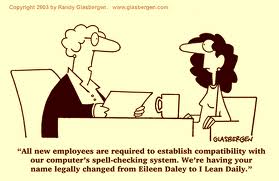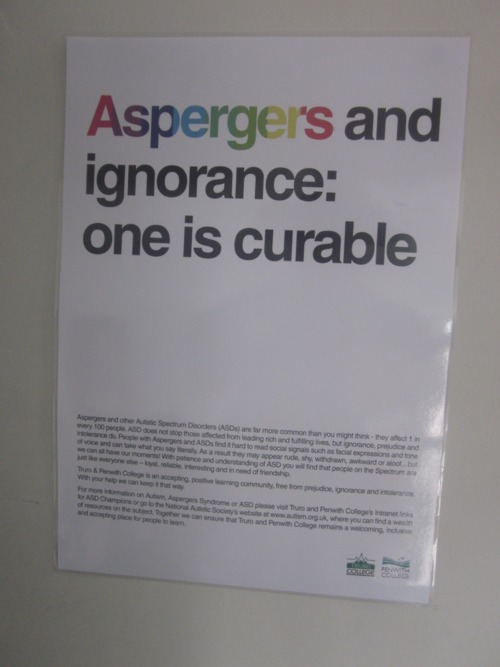 We are two weeks plus into the school year and the honeymoon phase is about over for most of my clients. They’ve made the transition, mostly without incident but not without anxiety and struggle, until this week. The emails and phone calls have started to trickle in with small blips that have sent them to the principal’s office, to the buddy room, to the safe seat. The recurring problem area this year relates to language, specifically what others deem “violent” language, both verbal and nonverbal. “I’m going to kill you”. A fake gun out of three fingers to one’s head. “Shut up or else.”
We are two weeks plus into the school year and the honeymoon phase is about over for most of my clients. They’ve made the transition, mostly without incident but not without anxiety and struggle, until this week. The emails and phone calls have started to trickle in with small blips that have sent them to the principal’s office, to the buddy room, to the safe seat. The recurring problem area this year relates to language, specifically what others deem “violent” language, both verbal and nonverbal. “I’m going to kill you”. A fake gun out of three fingers to one’s head. “Shut up or else.”
I know, and Tony Attwood has documented, that individuals with AS tend to use graphic language. Blood, guts, boogers, vomit. I think it relates to their visual strengths, as these words intensify their (and the listener’s) ability to imagine what is happening. NTs use these words for effect, for emphasis, for attention, purposes that are variations on the theme of storytelling.
Aspies use these words initially as echolalia. A video game, a movie, a peer, a parent, a sibling utters “I’m gonna kill you if you…” and the phrase resonates, perhaps with a special interest (i.e. video games, Civil War, combat, guns, the human body), perhaps because of how the words themselves sound, and perhaps due to its efficiency at producing a response. “I’m gonna kill you” immediately can mean so much — “whoa! back off” or “he means business, I better take him seriously” or “this could be dangerous”.
After the initial repetition comes the trial period. We’ve moved past novelty into the world of “Man, this really works.” The complicating factor is not knowing why it works, only seeing the end result. If someone is bullying you relentlessly and suddenly rolling around on the floor while mooing like a cow is an effective strategy, you’re likely not going to stop to analyze the rationale for its effectiveness. Well, not initially, and — what’s more — you have the power to process all of the core elements of a situation (social, nonsocial stimuli) that enable your social and environmental understanding. Our Aspies are not always so endowed. We roll and moo, they turn a phrase, it’s all the same: Mission accomplished. But, we all know it’s not that simple. The fallout indicates that the weight of the words is more than Aspies could ever fathom.
Case in point. I received a call yesterday from a local school with some of my favorite staff in the area. As the story goes, my client was unhappy with the topic of conversation in history class and used a piece of wire he found on the ground to make a pretend gun to pretend shoot at his classmate. He tells it very similarly. So, we have the same basic plot with the same basic ending, but the nuances and the subtle themes that provide the meaning to our story are far less developed. When I asked him “why” this mattered so much, his response was, “It’s mean.” Well, yes. Putting a gun to someone’s head is a mean gesture, but why? “Because I might kill her? But I wouldn’t. I won’t. I’d never.” Interestingly, another group member (who has struggled with this issue himself) said, “But they don’t know that. Our conditions make us vulnerable.”
We could say case closed on this page — the boys recognize that their words carry meaning due to the fear of a threat, due to the possibility of follow through, due to what another group member cynically called “paranoia”. The boys recognize the unfortunate life lesson that Asperger’s, and other “conditions”, bring stigma, judgment, and suspicion. But, I wouldn’t be satisfied with that rendition. It would be like Twilight without Full Moon, Harry Potter without the Deathly Hallows, War without the Peace. It’s not as though they emerge from the womb toting guns, talking like sailors, and ready to take no prisoners. On the contrary, these boys cringe when another says “pissed” or “crap”. These boys apologize for hurting a bug, for breaking a Lego creation, for saying something mean to their parents. They have deeply embedded rules about right and wrong. So, how does a make-shift gun and a threatening phrase sneak past their judgment?
I’m convinced that the answer lies more within the NT world than the ASD world and things get lost in translation. I’ve been asked to verify, “He won’t kill anyone right?” In essence, he says it without intent, right? Talk about a loaded weapon…I mean, question.
At dinner last night, I sat with an old friend and a new acquaintance. I listened to how we described things. “It kills me to think….” “If that doesn’t happen, I’ll have to….” “Shut up!” So, what’s the difference? I think, for now, two things (and I’m sure there are more). The first relates to delivery. We were laughing, joking, sharing, and confiding. Their was no anger, no fear, no suspicion, no concern. We sat in a large restaurant saying these things — just like most middle schools sit in a large cafeteria and say these things — without so much as raising a flag. No one gave us a side-long glance, no one called the manager, no one escorted us out. So, it could lead one to think that if you are joking and happy, these comments become okay. That was my initial thought, and I don’t entirely think it untrue but I think it’s not that simple.
The more important component is one of relationship. A relationship brings history, personal understanding, shared knowledge, and shared experiences. When I hear my friend say, “I’ll kill you if you tell her…” I know that she is not going to pick up her steak knife to stab me, push me down the stairs as we walk about of the restaurant, or try to commit vehicular homicide. As such, I laugh. She laughs. And, the new acquaintance begins to learn, to build a catalogue of how we interact. This catalogue acts as a reference guide letting her know what it “okay” and “not okay” — at their most basic levels. My friend and I have already created this catalogue but we add a new chapter and a new index entry with the new acquaintance. The relationship expands. It does not diminish due to our language. In fact, the language helps it grow.
So, why does this paradoxically simple and complex process fail to happen with Aspies? That is a loaded question that I should erase and revise so as to avoid easy, obvious, needed backlash. Interestingly, though, I would wager most NTs believe that relationships do, in fact, fail for those with ASD. I know better. I’ve seen better. I’ve seen these very boys joke with each other about “killing” and “shutting up” and “bombing” without so much as a blink of an eye, raised blood pressure, red alert. From them or from me. We have that shared history together in which we feel safe, free, and comfortable. Maybe the better question is why does it sometimes succeed, sometimes fail? Maybe it’s an Aspie-NT phenomenon, not an Aspie-Aspie/NT-NT issue. I’d like to think that the chasm between us isn’t so wide, so desolate. As a matter of fact, I know it’s not.
I go ’round and ’round with this issue. Trying to help them push past their impulsivity to utilize a more appropriate phrase, while all the while they hear the echoes of this language in the hallways, the classrooms, the locker rooms, and the lunchrooms. It seems to be simply words with friends…until spoken by an Aspie.







